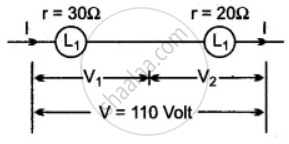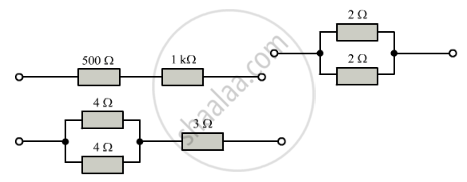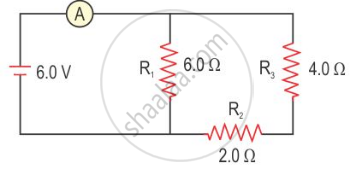Advertisements
Advertisements
Question
Two lamps of resistance 30Ω and 20Ω respectively are connected in series in a 110V circuit. Calculate:
(i) the total resistance in the circuit
(ii) the current in the circuit, and
(iii) the voltage drop across each lamp.
Solution

(i) Since the two lamps are connected in series, their total resistance R is given by:
R = R1 + R2
= 30 Ω + 20 Ω = 50 Ω
(ii) We have, V = 110 volt, R = 50 Ω
∴ By Ohm's law
I = `"V"/"R" = 110/50`A = 2.2 A
(iii) We now have
I = 2.2 A
∴ V1 = IR1 = 2.2 × 30V = 66 V
∴ Voltage frop across L1 = 66 V
Similarly, V2 = IR2 = 2.2 × 20 = 44 V
∴ Voltage drop across L2 = 44 V.
APPEARS IN
RELATED QUESTIONS
Why is the series arrangement not used for domestic circuits?
(i) Two sets A and B, of three bulbs each, are glowing in two separate rooms. When one of the bulbs in set A is fused, the other two bulbs also cease to glow. But in set B, when one bulb fuses, the other two bulbs continue to glow. Explain why this phenomenon occurs.
(ii) Why do we prefer arrangements of Set B for house circuiting?
Write down an expression for the resistance of a metallic wire in terms of the resistivity.
Calculate the combined resistance in each case:

State how are the two resistors joined with a battery when same current flows in each resistor.
Three resistors of 6.0 Ω, 2.0 Ω and 4.0 Ω are joined to an ammeter A and a cell of emf 6.0 V as shown in the following figure. Calculate :
- the effective resistance of the circuit.
- the reading of ammeter.

2Ω resistor A, 1Ω resistor B and 4Ω resistor C are connected in parallel. The combination is connected across a 2V battery of negligible resistance. Draw the diagram of the arrangement and calculate:
(i) The current in each resistor A and C,
(ii) The current through battery.
What should be the length of a nickel wire of area of cross-section 3 mm2 used for making a rheostat of 750 ohm? (ρ of nickle = 0.069 Ohm mm2/m)
A metal wire of resistance 6 Ω is stretched so that its length is increased to twice its original length. Calculate its new resistance.
What is the maximum resistance which can be made using five resistors each of `1/5` W?
